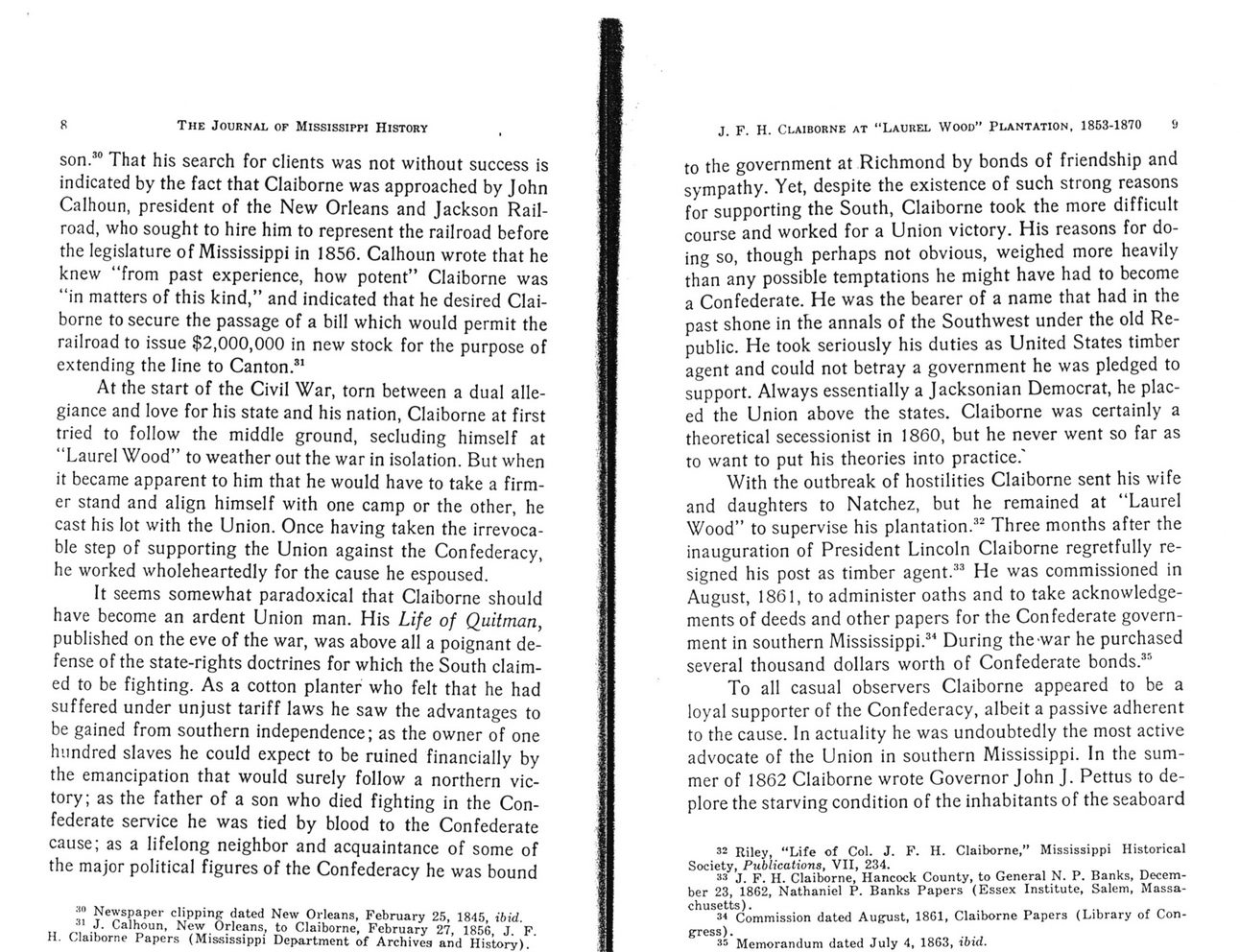This text was obtained via automated optical character recognition.
It has not been edited and may therefore contain several errors.
8 The Journal of Mississippi History son.30 That his search for clients was not without success is indicated by the fact that Claiborne was approached by John Calhoun, president of the New Orleans and Jackson Railroad, who sought to hire him to represent the railroad before the legislature of Mississippi in 1856. Calhoun wrote that he knew ?from past experience, how potent? Claiborne was ?in matters of this kind,? and indicated that he desired Claiborne to secure the passage of a bill which would permit the railroad to issue $2,000,000 in new stock for the purpose of extending the line to Canton.31 At the start of the Civil War, torn between a dual allegiance and love for his state and his nation, Claiborne at first tried to follow the middle ground, secluding himself at ?Laurel Wood? to weather out the war in isolation. But when it became apparent to him that he would have to take a firmer stand and align himself with one camp or the other, he cast his lot with the Union. Once having taken the irrevocable step of supporting the Union against the Confederacy, he worked wholeheartedly for the cause he espoused. It seems somewhat paradoxical that Claiborne should have become an ardent Union man. His Life of Quitman, published on the eve of the war, was above all a poignant defense of the state-rights doctrines for which the South claimed to be fighting. As a cotton planter who felt that he had suffered under unjust tariff laws he saw the advantages to be gained from southern independence; as the owner of one hundred slaves he could expect to be ruined financially by the emancipation that would surely follow a northern victory; as the father of a son who died fighting in the Confederate service he was tied by blood to the Confederate cause; as a lifelong neighbor and acquaintance of some of the major political figures of the Confederacy he was bound 30 Newspaper clipping: dated New Orleans, February 25, 1845, ibid. 31 J. Calhoun, New Orleans, to Claiborne, February 27, 1856, J. F. H. Claiborne Papers (Mississippi Department of Archives and History). J. F. H. Claiborne at ?Laurel Wood? Plantation, 1853-1870 9 to the government at Richmond by bonds of friendship and sympathy. Yet, despite the existence of such strong reasons for supporting the South, Claiborne took the more difficult course and worked for a Union victory. His reasons for doing so, though perhaps not obvious, weighed more heavily than any possible temptations he might have had to become a Confederate. He was the bearer of a name that had in the past shone in the annals of the Southwest under the old Republic. He took seriously his duties as United States timber agent and could not betray a government he was pledged to support. Always essentially a Jacksonian Democrat, he placed the Union above the states. Claiborne was certainly a theoretical secessionist in 1860, but he never went so far as to want to put his theories into practice.' With the outbreak of hostilities Claiborne sent his wife and daughters to Natchez, but he remained at ?Laurel Wood? to supervise his plantation.32 Three months after the inauguration of President Lincoln Claiborne regretfully resigned his post as timber agent.33 He was commissioned in August, 1861, to administer oaths and to take acknowledgements of deeds and other papers for the Confederate government in southern Mississippi.34 During the-war he purchased several thousand dollars worth of Confederate bonds.35 To all casual observers Claiborne appeared to be a loyal supporter of the Confederacy, albeit a passive adherent to the cause. In actuality he was undoubtedly the most active advocate of the Union in southern Mississippi. In the summer of 1862 Claiborne wrote Governor John J. Pettus to deplore the starving condition of the inhabitants of the seaboard 32 Riley, ?Life of Col. J. F. H. Claiborne,? Mississippi Historical Society, Publications, VII, 234. 33 J. F. H. Claiborne, Hancock County, to General N. P. Banks, December 23, 1862, Nathaniel P. Banks Papers (Essex Institute, Salem, Massachusetts). 34 Commission dated August, 1861, Claiborne Papers (Library of Congress). 33 Memorandum dated July 4, 1863, ibid.

Claiborne, J.F.H Claiborne-J.F.H-114